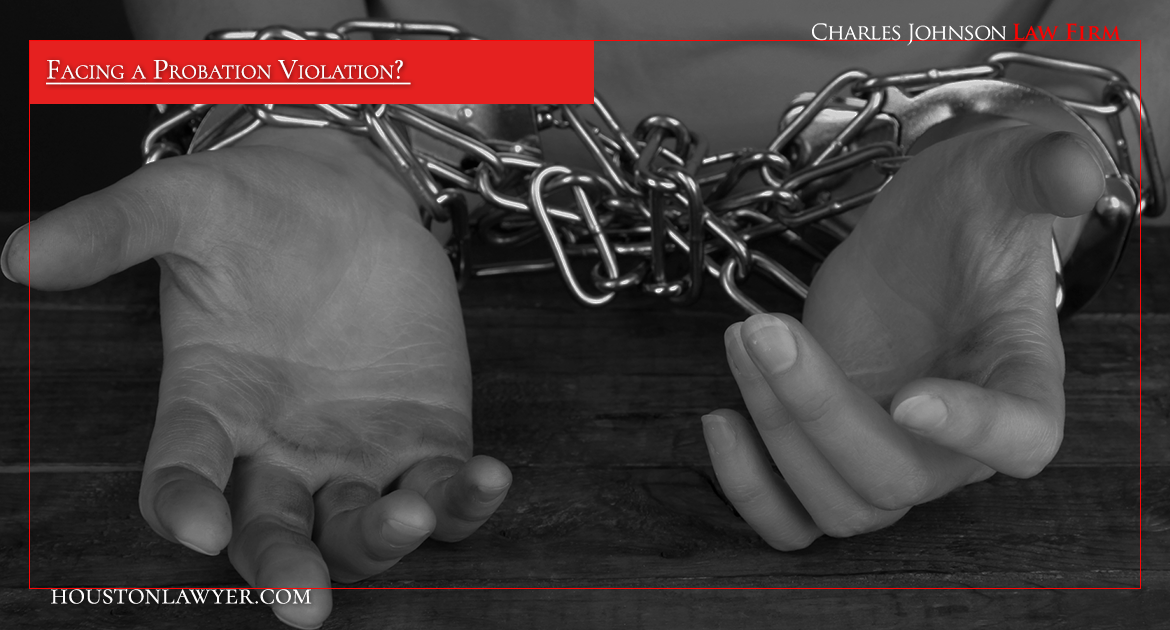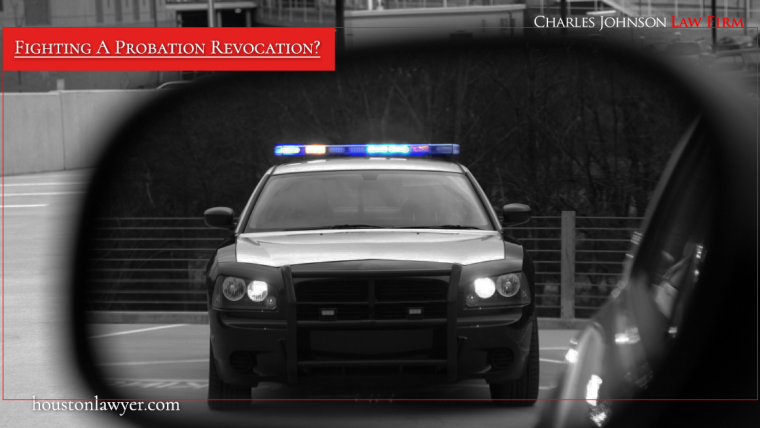Breaking the law while on probation can cause you twice the amount of trouble. Not only is it a probation violation, but it also opens a new criminal case against you, separate from the violation charge. You will face both a probation violation hearing and charges for the new crime.
When you contact Probation Violation Lawyer Charles Johnson promptly, he can advise you regarding what steps to take to reduce the chances of a jail or prison term. Houston Probation Lawyer Charles Johnson has the time and resources to assist you in getting your probation reinstated so that you go home with your family, rather than to jail or prison.
Contact Houston Lawyer Charles Johnson directly anytime day or night at (713) 222-7577 for your Free Case Review.
Expert Criminal Lawyer Charles Johnson can be reached directly 24 hours a day, 7 days a week.
Call him now at 713-222-7577 or toll free at 877-308-0100.
Major Credit Cards Accepted
Easy Payment Plans Available
If you were convicted of a crime and placed on probation (in lieu of serving a jail sentence) you have probably discovered that being on probation can be difficult. Depending on the crime you were convicted of and the jurisdiction you were charged in, probation can be difficult to follow. Probation can range from a simple non-reporting, “stay out of trouble for a year,” all the way to multiple meetings, counselling, drug tests, classes and a host of other rules and obligations. Knowing the ropes about your probation before you sign up can be crucial to your success or failure. That being said; what happens if you violate?
If you violate the terms of probation many different scenarios can take place. Here are the common steps for a criminal case involving a probation violation.
- Defendant gets convicted of crime.
- Judge sentences the defendant to a jail sentence but allows them to be on probation to avoid jail time.
- Judge reads the terms and condition of probation to the defendant or defendant signs a probation contract. Judge may assign a probation officer to look after the defendant.
- Time elapses and defendant may violate the terms of the probation.
- Prosecutor files motion to revoke probation and lays out the alleged violations in the motion and asks the judge to put the defendant in jail.
- Defendant hires a lawyer to help with the motion.
- Lawyer decides if there was a violation. If there was, lawyer talks with prosecutor to try to resolve the issue. If the issue cannot be resolved a hearing is scheduled.
- Judge has hearing and decides if prosecutor can prove a violation occurred.
- Judge decides what to do with the defendant if he finds a violation. If no violation defendant stays on probation.
If you are lucky enough to get probation after being convicted of a crime, you will have to follow strict rules. The consequences for breaking those rules, called probation violation, can be severe and may include steep fines or jail time.
Probation Explained
In order to understand probation violation, you must know the rules of probation. The specifics vary by state, but in general, probation is a punishment for committing a crime that allows you to spend less time in jail or avoid jail time altogether. In exchange for this leniency, you agree to certain restrictions on your life. Common probation rules require you to:
- Meet with your probation officer on a set schedule
- Attend counseling related to your offense, such as drug or alcohol abuse or anger management
- Get random drug tests
- Stay in a specific geographic area and/or wear a monitoring device
- Avoid contact with known criminals, such as members of your gang or other associates
- Perform community service
Probation is usually available only for misdemeanors and first-time offenders.
Examples of Probation Violation and Consequences
Probation violations usually take one of two forms: technical violations or new offenses. In both cases, the violation is considered a continuation of your original criminal case.
A wide range of potential probation violations may subject you to a probation revocation hearing, including:
- Failure to pay court-ordered restitution or imposed fines
- Commission of another offense while on probation
- Failure to appear at a court hearing
- Refusing to submit or failing a required drug test
- Possession of drugs or weapons
- Failure to attend counseling, drug treatment or a batterer’s treatment programs
- Failure to report to a meeting with your probation officer
Your probation officer will often handle technical violations. For a minor or first violation, you may get only a warning. For more serious or repeat violations, your probation officer may report you to the court and you will be required to attend a hearing. At the hearing, a judge will determine if you have committed a parole violation and will set your punishment. Punishments can vary based on the severity of the violation and your history of probation violations. Potential consequences include the following:
- Reinstate your probation based on the same terms and conditions
- Impose new terms and conditions based on modifying your probation
- Revoke your probation and impose your jail or prison sentence
- Payment of a fine
Certain challenges unique to probation violations make it essential to work with an experienced criminal defense attorney. Some rules of evidence are relaxed during a probation revocation hearing, which may allow evidence like hearsay to be admitted that would not be admissible in a criminal trial. Probation Violation Lawyer Charles Johnson vehemently fights against admission of such evidence based on other grounds, such as your constitutional right to confront witnesses.
Even if you know you have violated the terms of your probation, the sooner you contact the Charles Johnson Law Firm, the better your chances of minimizing the impact of the probation violation. I’ve successfully represented thousands of people throughout Texas, including many charged with violating their probation.
We can be reached 24 hours a day, 7 days a week.
Call us at 713-222-7577 or toll free at 877-308-0100.
Major Credit Cards Accepted.

